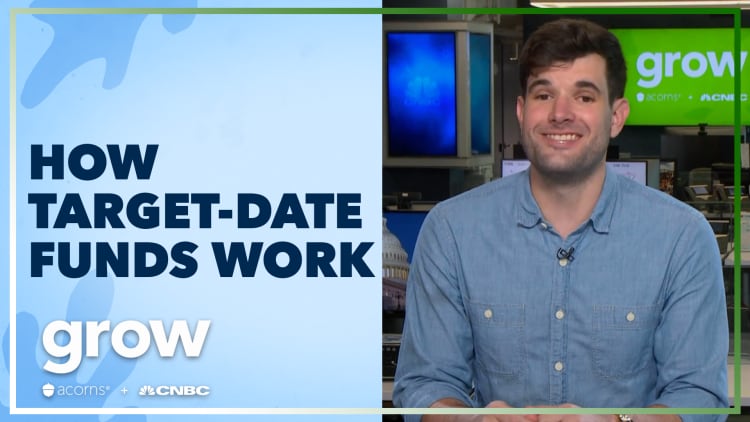If you're years away from retirement, the investing advice you receive usually goes something like this: Invest as much as you can as consistently as you can as early as you can and spread your bets among diversified investments so that compounding interest can work on your behalf.
When you do make the decision to retire, hopefully there is still plenty of life ahead of you — years that you may or may not have big, exciting plans for. For those plans to come to fruition, you'll have to be strategic with your retirement savings.
More from Grow:
Former financial advisor shares best advice for new investors
Take advantage of this account to build wealth, says money expert
How this 24-year-old turned $150 into $120,000 in 6 years
"The crazy thing that I've found in my career is that whether someone has a huge pension, no pension, a large nest egg, or a small nest egg, there is not one person who isn't afraid of outliving their money," says Clay Hessel, vice president of wealth management at Alera Wealth Services. "People with a net worth of $10 million are still afraid they'll run out."
In order to make sure that the money you spent a lifetime saving and investing can fund a happy and healthy retirement, financial experts suggest you start thinking about these three strategies, even if you're decades away from the finish line.
Be realistic about how much retirement income you need
If you're not thinking about what your retirement might look like yet, that's OK. In fact, if you've been consistently saving for your future, you're likely ahead of a lot of your peers. A quarter of U.S. adults have no retirement savings and just 36% feel that their retirement saving is on track, according to a recent survey from PwC.
Thinking about what funding your retirement might look like is a useful exercise, experts say, especially since the makeup of retirement in America is changing. "Retirement income used to be a three-legged stool: a pension, Social Security, and your own personal savings," says Chad Parks, founder and CEO of Ubiquity Retirement + Savings. "The reality is the boomers were really the last generation enjoying the traditional private pension. Some companies still do them, and they're still big in parts of the government, but you won't meet many 25-year-olds with a pension."
Social Security has its issues as well, Parks notes. According to the most recent estimates from the Social Security Trustees, the cash reserves being used to pay benefits will be depleted by 2034, which, barring a policy change, would necessitate a 22% reduction in payouts.
While virtually no expert expects Social Security to disappear, it's worth questioning how big a role the benefit might play in your retirement income picture, says Parks. "Are you going to 'count' on Social Security? My conservative planning would say not to," he says. "Think of it as something that's nice to have."

Video by Mariam Abdallah
Optimize your retirement savings now
Chances are, you're going to have to rely on your investments to provide much of your income in retirement. If that goal is decades away, financial pros say you'd be smart to allocate a bigger share of your portfolio to riskier assets, such as stocks. Because you have time on your side, the traditional thinking goes, your portfolio has time to recover from large drawdowns in the stock market. As you near retirement, traditional planning rules dictate that you shift more of your portfolio into safer assets, such as bonds, which are less prone to sharp drops that can cripple your savings right when you're getting ready to use them.
But depending on when you retire, how much money you have, and the lifestyle you're looking to lead after you're done working, executing this strategy can get tricky. The main problem: You don't know how long your money is going to need to last. If you retire at 65, you could very easily have to fund 25 more years' worth of living expenses to go along with all the golf you want to play and the cruises you want to take.
You may want to take some risks in your portfolio to fund the lifestyle you want to lead, but those risks need to be calculated, says Hessel. "There are a whole bunch of studies out there that say if your portfolio suffers a full bear market exposure in the two years prior to or post-retirement, it will have an extreme impact on your nest egg, and you will probably run out of money."

Video by Tala Hadavi
To avoid this fate, Hessel suggests retirees use a "bucket" approach, assigning different uses for baskets of their savings. Under one strategy, you'll have to calculate your essential living expenses, such as food, housing. "Tie these expenses to guaranteed income sources, such as Social Security, pensions, and annuities," he says. "For more discretionary expenses, such as travel and entertainment, you can withdraw from money you're willing to take more risk with."
Another approach for those willing to take chances: You could plan, as a retiree, to sell enough of your portfolio to cover 10 years' worth of expenses. "You put that money in risk-free, liquid assets so you can say, 'My next 10 years are bought and paid for,'" he says. "Then you can invest the remainder of the portfolio with a 10-year time horizon" – an amount of time that can help you, as an investor, withstand more market volatility.
Consider an annuity
The financial environment that you expect to retire in can present a problem, too. In today's low-interest rate world, for instance, bonds continue to provide portfolio protection for retirees but offer little in the way of interest payments. "In the traditional 40% stock, 60% bond retirement portfolio, you used to be able live off of clipping coupons from your bonds," says David Lau, founder and CEO of DPL Financial Partners. "Generating income without taking on all the risk you get from equities is a big problem for retirees."
For some retirees, part of the solution to that problem is buying an annuity, a contract issued by an insurance company that guarantees the person who buys it a steady stream of payments for the rest of their life. You can purchase an annuity either via a lump sum payment or by paying monthly premiums.
Generally, the size of your monthly payment will depend on how much money you put in, how long you defer collecting payments, and your life expectancy. The upside of purchasing one is clear: "Safe investments are yielding very little," Lau says. "Low-cost, commission-free annuities can generate 5%, 6%, 7% for life."
Generating income without taking on all the risk you get from equities is a big problem for retirees.David LauFounder and CEO, DPL Financial Partners
Many retirees replace about half of what would be their bond portfolio with an annuity, with the goal of covering essential expenses with guaranteed income, Lau says. Whether this is a viable strategy for you depends on the size of your portfolio. You can use online calculators to determine how much a certain amount of guaranteed income will cost. These calculators don't account for fees, which can be quite high depending on the annuity and the payout options selected.
For many people, the amount you'll need to pay might be shocking, says Parks. "It takes a lot of money to guarantee income for life," he says. "And the insurance company will calculate it in a way that makes it likely they'll come out ahead on the deal."
While adding an annuity may be right for you, experts say you'd be smart to consult a financial professional before purchasing one. The rules surrounding them are complicated, and failure to understand them could lead to negative tax consequences. Another risk: Annuities aren't backed by the federal government, so the guarantee of a payout only goes as far as the insurance company's ability to deliver it. "Insurance companies can fail. They have failed in the past," says Parks. "Promises they made can go away. It's not risk-free." Your financial professional should also be able to provide information on company ratings, such as a financial strength rating from AM Best, which in based on the insurer's ability to meet its ongoing obligations.
The article "Even ‘People With a Net Worth of $10 Million’ Fear Making This Retirement Mistake: 3 Ways to Avoid It" was originally published on Grow (CNBC + Acorns).



